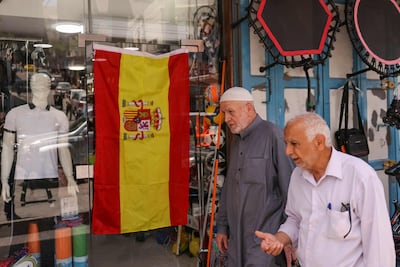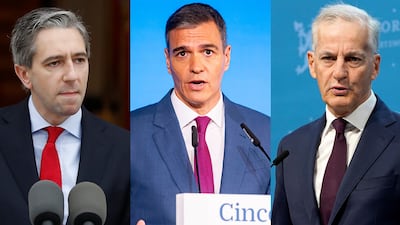LATEST: Live updates as Norway, Spain and Ireland recognise state of Palestine
In a co-ordinated move, Norway, Spain and Ireland on Wednesday announced their intention to officially recognise Palestine next week.
The announcement was spearheaded by Spanish Prime Minister Pedro Sanchez, who has been lobbying a number of other countries to recognise Palestine as a state in the hope of relaunching peace talks and end the Israel-Gaza war.
The US and the EU support a two-state solution to the conflict but only nine EU countries have recognised Palestine so far. Many did so in 1988 under communist rule and have since shifted alliances closer to Israel.
Sweden was the last EU country to make a move in 2014, triggering a diplomatic spat similar to Israel's decision on Wednesday to withdraw its ambassadors from Ireland and Norway.
Moving forward, what is the likely impact of the triple announcement?
What is the view among other western countries?
Erwin van Veen, senior research fellow at Dutch think tank Clingendael, said for much of western Europe, the legacy of the Holocaust, Christian affiliation with the Jews in the context of the Holy Land and a "good dose of Orientalism" represent major incentives to support Israel.
The US, the UK, Germany and France are unlikely to recognise a Palestinian state soon for reasons that are historical, religious and interest-based, Mr van Veen told The National.
The UK's position is closely related to its colonial legacy and the 1917 Balfour Declaration, which paved the way for a Jewish state.
"For the US, it's more complicated. Christian evangelicals consider Israel to be the Holy Land where the last judgment will be rendered," said Mr van Veen. "But there is also the shared notion that both countries are frontier nations, as well as realpolitik-style interests with Israel serving as US military outpost in the Middle East."
In a recent UN General Assembly vote, Washington was among nine states to reject recognition.
The UK has sent more mixed signals by choosing to abstain, as did France and Germany.
In a statement, Germany's Foreign Ministry said while it believed in a two-state solution, it abstained because the vote would not achieve peace.
France's President Emmanuel Macron has said recognition was "not taboo" but has not signalled an intention to move forward with it any time soon.
A representative for Foreign Minister Stephane Sejourne on Tuesday said "conditions were not met" to bring about a two-state solution.
Speaking to French daily Le Monde, French diplomatic sources said it may weaken negotiations with Israel. "We are depriving ourselves of a [pressure] tool at a time when Israel is least sensitive to external pressures," they said.
senior policy fellow at the European Council on Foreign Relations
Such arguments fall flat after decades of failed negotiations and increased illegal Israeli settlements, said Mr van Veen. "They confuse cause and effect," he said.
Why is it important?
The recognition of Palestinian statehood by three western countries is an important symbol that comes two days after the International Criminal Court said it would request arrests warrants for Israeli Prime Minister Benjamin Netanyahu and Hamas leaders.
Roughly three quarters of the world recognises a Palestinian state but most of those holding out are in Europe and the Americas.
"The Rubicon has been crossed," said Mr van Veen.
"It will set a precedent to increase pressure on others to follow suit, if only because civil society organisations, political parties and protesters can use it in their own home countries."
Hugh Lovatt, senior policy fellow at the European Council on Foreign Relations think tank, said: "This is not just three European countries recognising Palestine in a vacuum.
"It's happening in close co-ordination with other European countries and in co-operation with Arab countries, including Saudi Arabia, which has been leading Arab efforts to develop a political plan to revive Israel-Palestine negotiations in support of a two-state solution."
Steps previously viewed as taboo have taken place, such as imposing sanctions on extremist Israeli settlers, announced by the US in February and followed by the EU in April.
"This recognition is part of a broader puzzle that's starting to come together," said Mr Lovatt.
Spain's lead on the matter looks to be linked to strong public opinion in support of recognition, a full decade after the Spanish Parliament voted emphatically in favour.
"Spain is saying 'someone needs to do something'," said Haizam Amirah-Fernandez, professor of international relations at IE University in Madrid.
"Making no attempt to change a decade-old formula is not an option. It creates a major risk for Europe itself," he told The National.
What other countries may follow?
Belgium, Slovenia, and Malta have said they might be interested in recognising Palestinian statehood alongside Spain but have so far not made any announcements.
Like his Spanish counterpart, Alexander De Croo, Prime Minister of Belgium, has been the target of Israeli criticism for drawing attention to the suffering of civilians in Gaza as early as November.
But Belgium is unlikely to recognise Palestinian statehood due to divisions within the government, imminent elections and because it currently holds the rotating presidency of the EU Council, said Koert Debeuf, distinguished adjunct professor at the Brussels School of Governance.
"There has been more public debate on the matter in Belgium, unlike the Netherlands, for example,” he said.
Support for Israel in the Netherlands is linked to a mixture of a shared Christian biblical tradition, identification with Israel as a liberal western democracy and a view of Palestinians as "the other" in the context of decades of anti-Muslim political speech acts, Mr van Veen said.
Dutch MP Raymond de Roon, from far-right party PVV, recently described Palestinians as a "fake people". Mr de Roon is chairman of Parliament's foreign affairs committee.
The Netherlands also abstained at the UNGA vote on Palestinian statehood.
Slovenia remained silent on Wednesday but its Foreign Minister Tanja Fajon previously told The National that recognising Palestinian statehood could not wait any longer.
A final decision on recognition requires a parliamentary vote.
What territory is being recognised?
No Palestinian state exists on the ground today despite a 1948 UN decision to divide the UK's mandate over Palestine into two states, one for Jews and another for Arabs.
The Gaza Strip has been ruled since 2007 by Hamas, a militant group that is viewed as a terror organisation by the West. The occupied West Bank is in part overseen by the Palestinian Authority. But the illegal presence of 700,000 Israeli settlers is widely viewed as hindering prospects of a future Palestinian state. Israel seized East Jerusalem and the West Bank in a 1967 war.

A Palestinian state should be based on pre-1967 borders with Jerusalem as the capital of both states as set out by the 1949 armistice agreement, the Norwegian government said in a statement.
"In the longer term, we hope that the recognition of Palestine as a state will encourage the parties to restart peace talks with a goal of finding solutions to the outstanding final status issues. A Palestinian state will also enhance security for the Israelis,’ said Norway's Foreign Minister Espen Barth Eide.
Both the PA and Hamas welcomed Wednesday's triple announcement.
Mr Eide said the PA needed to be strengthened and govern Gaza after a ceasefire. "The goal is to achieve a Palestinian state that is politically cohesive, and that derives from the Palestinian Authority," he said.
What happens for Palestinians now?
A lot of work is needed to change Israeli public opinion from support for occupation and to revive the Palestinian national movement, Mr Lovatt told The National.
Mounting pressure on the current far-right Israeli government has caused it to lash out against the PA in a move that analysts warned may backfire. Finance Minister Bezalel Smotrich called on Mr Netanyahu to take punitive steps that include freezing tax transfers held by Norway on behalf of the PA.
"This is opportunism," said Mr Lovatt. "Israel is punishing the PA at a moment when it is extremely vulnerable financially because it is the weaker party that Israel can most harm. It doesn't change in any fundamental way the situation as it existed yesterday. Europe and the US cannot allow themselves to be blackmailed."
Human rights organisations say Palestinians living in Israel are the target of discriminatory laws, while Palestinians in occupied territories including the West Bank are the subject of harassment, forced displacement and murder at the hands of settlers, with the support of the Israeli army. Some have described this situation as apartheid, a claim rejected by Israel.
Speaking on the second day of an Israeli raid in Jenin during which eight people were killed, Israeli Defence Minister Yoav Gallant on Wednesday said he would repeal a 2005 disengagement law, a move approved by the Knesset last summer. This would allow Israeli settlers, evicted by the law, to return legally to settlements in the West Bank.
Mr van Veen warned a "bigger train crash" is to come if Israel continues to refuse Palestinians' right to self-determination.
"Israel may say it doesn't care about the opinion of countries like Spain, but this kind of pressure will accumulate with time and produce effects that are difficult to foresee," he said.































